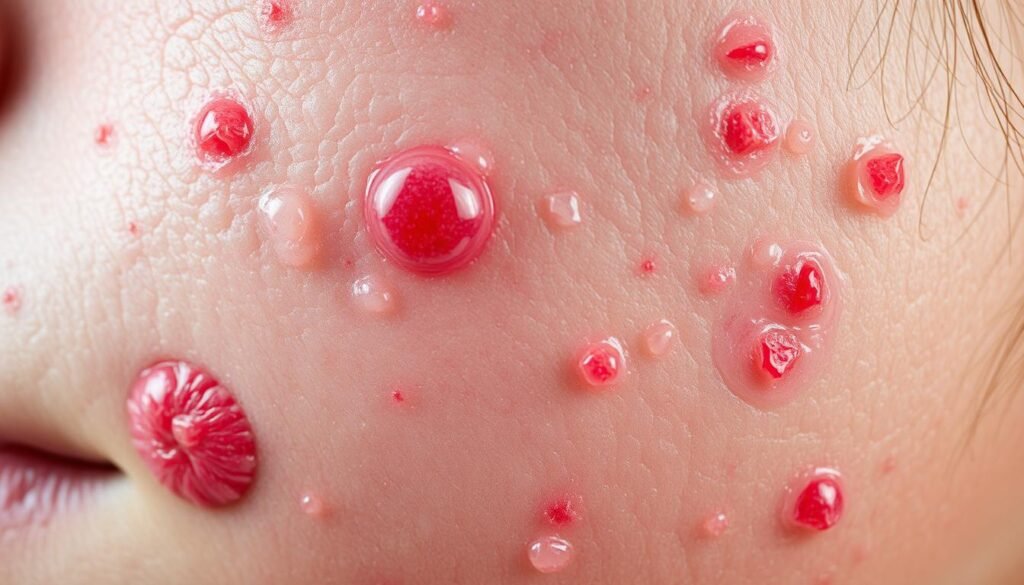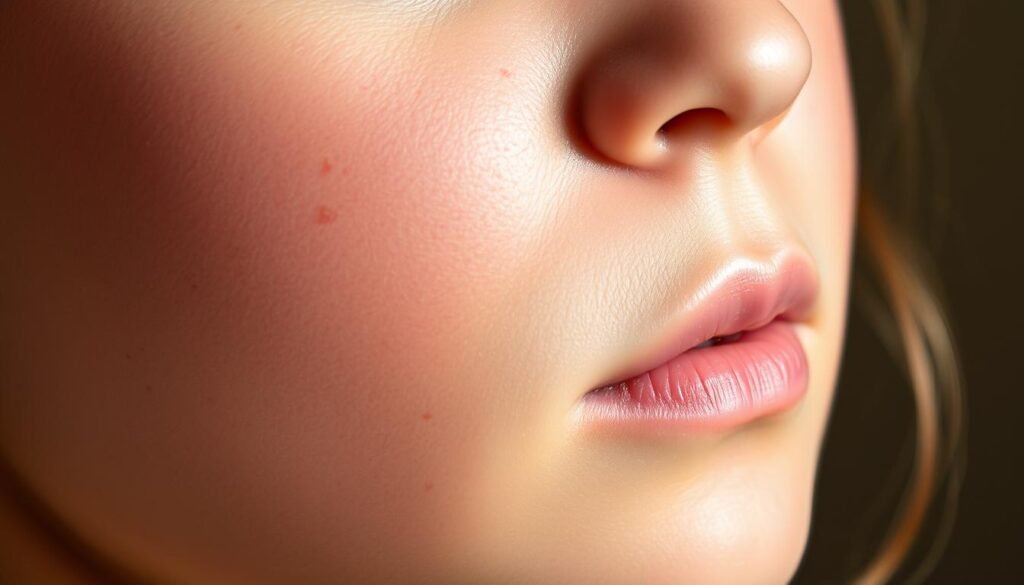Did you know about 85% of people will get acne sometime in their life? It’s not just for teens. This skin problem often comes from hormonal fluctuations that anyone can face, no matter their age. Learning about hormones and acne is key to managing it well. We look into the hormone and skin health link here, focusing on how puberty, pregnancy, menstrual cycles, and menopause can start acne flare-ups.
We want to give you the knowledge on hormones’ big role in starting acne. It’s important to understand their effect during life’s different stages. By knowing this, you can pick better skin care and treatments.
Key Takeaways
- A lot of people will deal with acne at one point or another.
- Hormonal changes are a big reason behind acne.
- Knowing about hormonal effects helps manage acne well.
- Changes during puberty, pregnancy, and menstrual cycles are key moments.
- Changing skin care routines for these hormonal times can help your skin.
Understanding the Connection Between Hormones and Acne
Hormones, especially androgens and estrogens, greatly affect acne. They change how much oil our skin makes. More oil can plug pores and lead to acne.
Stress also plays a big role in acne. It can make acne worse by raising certain hormones. Knowing this can help us manage acne better.
It’s key to understand these hormone effects on acne. Doing so lets us take steps towards healthier skin. For severe acne, it’s best to see a specialist. Learn more about hormonal acne here.
Stress impacts our skin too. It releases hormones that can trigger acne.
Research shows managing stress helps clear skin. It reduces those acne-causing hormones. For tips on handling stress and acne, click here.
What is Hormonal Acne?
Hormonal acne is a type of acne linked to hormone changes. It often appears as deep, painful cysts. These typically show up on the jawline, chin, and cheeks.
Teenagers and reproductive-age women are most likely to get hormonal acne. This is because of changes during puberty, menstrual cycles, and pregnancy. A person’s genes can also make them more likely to get hormonal acne.
To manage hormonal acne, it’s vital to know what causes it. For more details, check this resource on hormonal influences that worsen acne. Understanding this can help clear your skin and improve confidence.
| Demographic | Common Acne Types | Impact of Hormones |
|---|---|---|
| Teenagers | Hormonal Acne | Increased oil production during puberty |
| Women of Reproductive Age | Hormonal Acne | Menstrual cycle fluctuations |
How Hormones Influence Acne
Hormones have a big role in acne’s development. They affect our skin significantly. Androgens and estrogens are especially important.
Impact of Androgen Hormones on Skin
Androgen hormones, like testosterone, impact our skin’s health. They make our skin produce more sebum. This can block pores and cause acne.
Some people’s skin reacts more to androgens, leading to breakouts. Sebum mixes with dead skin cells. This mix helps bacteria grow and makes acne worse.
The Role of Estrogen Hormones in Acne Management
Estrogen helps keep our skin healthy. It controls how much oil our glands make. This balance is key for clear skin.
When our estrogen is at the right level, our skin looks better. Studies show that balanced estrogen can lessen acne problems.

Puberty and Acne: The Hormonal Surge
During puberty, teens go through big hormonal changes. This often leads to skin problems, like acne. The androgens, including testosterone, spike at this time. This causes more oil production in the skin, leading to clogged pores and acne.
Girls usually enter puberty between 9 and 14 years old, and boys start a little later, from 10 to 17. The skin makes too much oil during this time. It can’t keep up with the excess sebum. This results in acne outbreaks, which can be tough for many teens.
Acne isn’t just about how you look; it affects how you feel about yourself. It’s important to know how puberty and acne are connected. Teaching teens early how to care for their skin can help them manage acne better.
| Age Range | Typical Hormonal Changes | Associated Skin Issues |
|---|---|---|
| 9-14 (Girls) | Increase in estrogen and androgen production | Initial acne breakouts, oily skin |
| 10-17 (Boys) | Surge in testosterone levels | More severe acne, frequent breakouts |
| 15-18 (Both) | Hormonal fluctuations continue | Persistent acne, scarring potential |
It’s crucial to tackle the issues that cause acne in teens. Doing so helps build a positive self-image and emotional health.
Menstrual Cycle Acne: Patterns and Triggers
Many women notice acne flares linked to their menstrual cycle. It’s key to understand how hormone changes can lead to more breakouts. We will look at how the menstrual cycle affects acne. We focus on the increase of progesterone and how to handle acne during this time.
Link Between Menstrual Cycle and Acne Flares
Progesterone levels go up during the menstrual cycle’s luteal phase. This increase can make skin oilier, leading to acne. Acne often gets worse the week before menstruation as estrogen drops. This lets progesterone’s effects show more. Knowing this pattern can help women prepare and control their acne better.
Managing Menstrual Cycle Acne
Dealing with menstrual acne requires both lifestyle changes and treatments. Here are key methods:
- Eat a diet full of antioxidants and low in refined sugars to help your skin.
- Try over-the-counter products with salicylic acid or benzoyl peroxide for breakouts.
- Reduce stress with yoga or meditation to keep acne at bay.
- Talk to a healthcare provider about hormonal therapy to manage hormone levels.
| Management Strategy | Description | Benefits |
|---|---|---|
| Dietary Adjustments | Adopting a diet rich in fruits, vegetables, and whole grains. | Supports overall health and reduces inflammation. |
| Topical Treatments | Using products with active ingredients that target acne. | Directly reduces the severity and frequency of breakouts. |
| Stress Management | Engaging in activities that lower stress levels. | Helps prevent acne flare-ups linked to stress hormones. |
| Hormonal Therapy | Consulting a physician about birth control options or other therapies. | Can stabilize hormonal fluctuations that trigger acne. |
Pregnancy Acne: Hormonal Changes During Pregnancy
Pregnancy acne is a skin issue that many expectant mothers face. It’s mainly due to big hormonal changes during pregnancy. These changes happen a lot in the first and third trimesters. They can make the body produce more oil, leading to blocked pores and, sadly, more acne.

When dealing with skincare during pregnancy, it’s key to be gentle. Expectant mothers should try solutions that don’t involve drugs, like:
- Gentle cleansing products to avoid skin irritation
- Non-comedogenic moisturizers that won’t clog pores
- Lightweight sunscreens to protect sensitive skin
Talking to a healthcare provider before trying new treatments is critical. Many acne treatments are not safe for the baby. Natural methods can be a good choice to help with pregnancy acne, keeping both mother and baby safe.
For more details on handling acne while pregnant, look at this resource on pregnancy acne.
Birth Control and Acne: Hormonal Regulation
Birth control can be vital in managing hormones, especially for acne sufferers. Different contraceptives affect hormone levels and skin health. Knowing how birth control choices impact acne is key for effective management.
Different Types of Birth Control and Their Effects
Hormonal birth control varies in its effect on acne. Below is a summary of common contraceptives and their acne impacts:
| Contraceptive Method | Hormonal Components | Effect on Acne |
|---|---|---|
| Combined Oral Pills | Estrogen and Progestin | Can effectively reduce acne by balancing hormone levels |
| Progestin-Only Pill | Progestin | May worsen acne in some individuals |
| Hormonal IUD | Levonorgestrel | Generally helps improve acne by releasing progestin locally |
| Birth Control Patch | Estrogen and Progestin | Similar benefits to oral pills in managing acne |
| Birth Control Injection | Depo-Provera (Progestin) | Can cause acne flare-ups in some users |
Choosing the Right Birth Control for Acne Management
Choosing the right contraceptive involves considering your skin type, hormonal therapy history, and needs. Consulting a healthcare professional is crucial. They provide personalized advice. This helps in finding the best method for birth control and acne control, while considering side effects and your health background.
Adult Acne: Navigating Hormonal Fluctuations
Adult acne is common, especially in women, due to hormonal changes. Stress, pregnancy, and menopause can affect skin health greatly. During these times, many women see more breakouts, impacting how they look and feel about themselves.
Adult acne can be more than skin deep. It can lead to anxiety, frustration, and embarrassment. Treating it includes a good skincare routine and, sometimes, medical help. These steps can make a real difference.
Treatment options are important to consider. Hormonal contraceptives might help balance hormones and lessen acne. Changing your diet and lifestyle can also improve your skin’s health. Together, these can lead to better skin.
For more on handling adult acne and hormonal changes, this research offers great advice. It highlights the need for personal plans and expert opinions.
| Factors Influencing Adult Acne | Impact on Adult Acne |
|---|---|
| Hormonal Fluctuations | Increased oil production, leading to clogged pores |
| Stress | Triggers cortisol release, worsening skin inflammation |
| Diet | Certain foods may contribute to increased breakouts |
| Lifestyle Choices | Exercise and hydration play supportive roles in skin health |
Conclusion
Hormones and acne are closely linked, especially during puberty, menstrual cycles, pregnancy, and adulthood. These changes can greatly affect your skin. Understanding this can help you find the right skincare to balance hormones and reduce acne.
Knowing the role of hormones in acne is key. You can then pick the best skincare products. You might also talk to doctors or consider birth control for acne management. Taking action helps clear up your skin and boosts your confidence.
Managing acne is a personal journey. By learning about hormones and staying aware, you can take control of your skin health. This knowledge makes you more confident in your appearance.